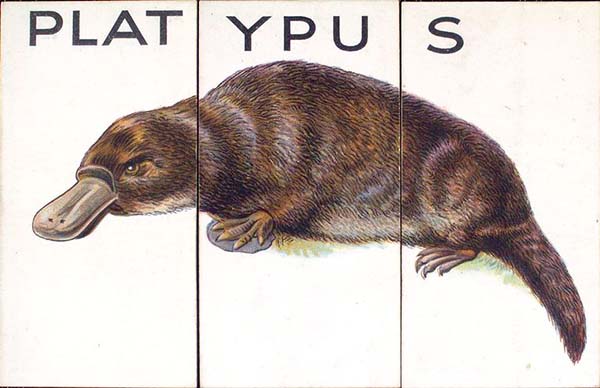It has been said that a camel is a horse designed by a committee. We might think of the platypus in much the same way, though the key difference is perhaps that—as of yet—it is unclear what the Platypus Committee was trying to create. Regardless, the platypus has long been emblematic of the limitations of scientific classification. An egg-laying, duck-billed, poisonous mammal: the only surviving member of its species and genus. It is this persistent and natural spirit of disruption and provocation that led the founders of this blog to christen it with the name of this thoroughly confusing and fascinating creature. Its defiance of orderly categorization serves as both a metaphor and motivation for the continued intersection of anthropology and science and technology studies, sometimes considered strange bedfellows.
I believe that the study of science and technology as it relates to the human—both the being and the category—is more urgent now than ever. As we begin to understand that many of the effects of climate change on our biosphere will be unavoidable, adaptations and solutions will require a thorough examination of both their impact on humans and their anthropogenic causes. With the popularization of the smart phone and the seemingly inevitable ubiquity of AI in our lives in the very near feature, it is crucial that that the anthropology of science and technology not only take part in the corresponding conversation concerning human-machine ethics, but be at its vanguard, finding new and more accessible ways to communicate our research and expertise to the general public. And as social media has become an increasingly legitimate platform for everything from romance, to advertising, to—like it or not—governmental policy, we must continue to strive to understand the ever-changing nature of our mediascape and the now seemingly irreversible imbrication of traditional media, digital and new media, and the people who use them.
Decolonizing Anthropology and STS
Despite the seeming ubiquity of these technologies, however, we as anthropologists are uniquely positioned and called to understand the socioculturally, racially, and geographically stratified differences in access, know-how, and innovation inherent in our increasingly unequal technological landscape. What does it mean that the hands who build our smartphones and computers are those least likely to ever touch them outside the walls of a sweatshop? How do we continue to value the undeniably positive contribution of new technologies and scientific approaches while engaging meaningfully with the ethical issues they inspire? How can we work to decolonize STS and anthropology, holding space for and amplifying the voices of those who have too often been excluded from these conversations?
Unfortunately, the anthropology of science and technology has sometimes been guilty of giving short shrift to these issues in favor of a focus on the Global North. However Platypus, since its inception, has actively sought to wrestle with these pressing issues, and as the blog has expanded, so has its ability to amplify a diversity of perspectives. In the past year alone, we have published posts on the YouTube presence of FARC guerrillas in Colombia, the politics of sugar cane in a newly right-wing Brazil, the ethical politics of mechanized warfare, the intersection of disability and avatars in online spaces, the disconnect between humanitarian efforts and non-normative bodies in Uganda, and the shifting role of scientific discourse in Chile’s trans rights movement. We ran series on Law in Computation, Disabling Technologies, and Living with Water. Additionally, we continued our effort to publish more bilingual posts, inviting people from around the globe—and our interlocutors themselves—to play an active part in the conversations their contributions spark online.
What the future holds
These innovative and often invisibilized perspectives were brought to Platypus by a team of contributing editors who are continually on the lookout for topics that will push the limits of anthropology and STS, and the coming year promises to be no different. Thanks to the hard and dedicated work of our new and continuing contributing editors, this year’s content will continue to expand our understanding of what the anthropology of science and technology can be, what kinds of questions it can ask, and what forms its conclusions can take. (Stay tuned for an introduction to the new team!)
In addition to continuing to expand bilingual access to new posts, I hope over the next two years to open the platform up to a wider variety of formats, allowing contributors to explore their relationships with the very technologies they study in more experiential ways. I also hope that this emphasis on experience-based knowledge production will inspire posts on the role of technology in pedagogy, allowing educators at all levels to share ideas about the advantages and challenges they face when incorporating new technologies into the learning process. In short, my aim is for the content of this blog to continue to live up to its namesake. Platypus has long been a place where disparate and diverse perspectives meet to form a whole, albeit a whole that constantly challenges our ability to define it.
As the incoming editor of Platypus, I am excited to carry on this legacy, in some small way contributing to a conversation that pushes the boundaries of what the anthropology of science and technology can tell us about our rapidly changing world and the people who live in it.

